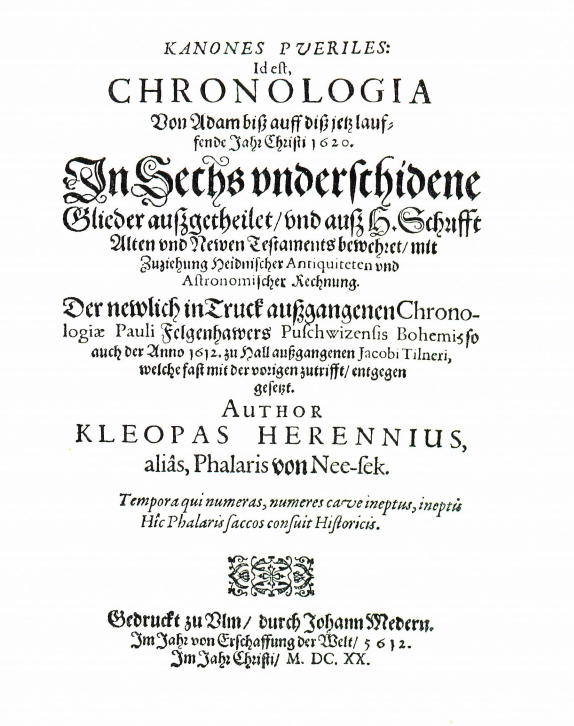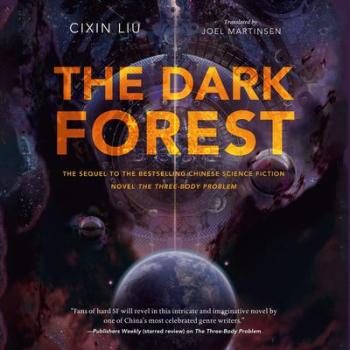I’ve been meaning for a while to blog about an article by Hank Campbell which reflected on an episode of Cosmos. He notes the tendency to poke fun at Archbishop Usher’s calculation of the age of the earth, so badly wrong from our perspective, while never poking fun at Johannes Kepler, who held a similar view. Here is a sample from the article:
Neil Tyson tells us about Ussher and then we fast forward to modern geology and how much smarter we are now. Okay, fine, but was Ussher all that wrong for the time? Was anyone doing better? No. What they leave out is that a legendary scientist was just as wrong.
Like any good scientist, Ussher interpolated from what he had, in this case the Bible and a historical date for the death of the Bablyonian King Nebuchadnezzar II in 562 B.C. Deriving from that, he back-azimuthed generations to arrive at the exact day that the Earth must have been created in 4004 B.C. “It was a Saturday,” Tyson says, with perfect comedic timing. And completely wrong, as we now know.
But it wasn’t bad deduction – on the contrary, his work in Annales Veteris Testamenti was impeccable. Most of what I learned about black holes 30 years ago is wrong today – does that mean a future science show should ridicule us for accepting it back then? Ussher was no shill, in the vein of modern numerology pretenders like Harold Camping or John Hagee, who knowingly foist off nonsense on gullible people today. And contrary to what anti-religious zealots insist, religious people who accepted his work in 1650 were not sticking their heads in the intellectual sand against science, they were actually embracing the latest reasoning – just like they had accepted the equally incorrect numbers of a scientist a few years earlier, one who did not ‘count the begats’, as Tyson said while ridiculing Ussher.
Johannes Kepler is rightly considered a pillar of modern science for his work explaining the motion of planets, they are called Kepler’s Laws of Planetary Motion because they are that fundamental. By 1601, at the age of 30, he had the job of Imperial Mathematician for the Holy Roman Empire. Kepler was into a lot of stuff, he was prolific, and he was loyal. And so at one point he wrote a polemic for a friend that also served to debunk some bad calculations by those projecting the impending apocalypse.
While on October 22nd, militant atheists love to ridicule Ussher, very few will ridicule Kepler this weekend, even though in KANONES PUERILES, 30 years before Ussher, Kepler calculated April 27th as the universal creation date. That would be April 27th of 4,997 BC…
Just as host Neil Tyson says of Ussher, the calculation by Kepler was also “taken as gospel in the Western world” so it seems odd that once again Cosmos, a show about science, instead trots out a priest as a straw man to place in opposition to more recent scientific discovery. Sure, Ussher was wrong, as was Kepler, and as was every number calculated by scientists hundreds of years later. They became slightly less inaccurate, but they were still wildly wrong. An archbishop got a different number than Kepler by a few hundred years – but Kepler was wrong by 13.7 billion. Even Martin Luther, he of the Protestant reformation, was more accurate than Kepler, and he did no math at all.
To me, it seems that calling Kepler or Usher a “young-earth creationist” is problematic. The modern movement by that name insists that the earth is young despite overwhelming evidence to the contrary. Ussher and Kepler, in contrast, merely assumed the earth was young but would likely have been open to revising their views if they had new evidence. And so the two stances may overlap on the age of the earth, but in terms of approach, they are diametrically opposed.
See also David H. Bailey’s post on whether religion has always been at war with science, Ken Schenck’s post on the flood story, and also, by way of follow-up to my earlier post “The Solid Sky,” the piece by Rabbi Natan Slifkin, “The Sun’s Path at Night,” on how ancient rabbis understood cosmology.













